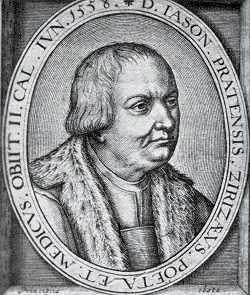Jason Pratensis
Jason Pratensis (1486–1558), also known as Jason van der Linden, was a prominent 16th century physician and botanist from the Netherlands. He is best known for his work in the field of medicine and his contributions to the early development of botany as a scientific discipline. Pratensis was a contemporary of other renowned figures in the history of medicine and science, such as Paracelsus and Andreas Vesalius, and played a significant role in the transition from traditional to Renaissance medicine.
Biography[edit | edit source]
Jason Pratensis was born in 1486 in the town of Pratteln, near Basel, Switzerland, but spent most of his professional life in the Netherlands. He received his education at the University of Leuven, where he later became a professor of medicine. Pratensis was deeply influenced by the Renaissance humanism of the time, which emphasized a return to the direct study of the texts of antiquity, and he applied these principles to the study of medicine and natural history.
Throughout his career, Pratensis advocated for the use of empirical observation and the study of nature as the basis for medical knowledge, challenging the prevailing reliance on Galenic texts that had dominated medieval medicine. His approach represented a significant shift towards modern scientific methodology in medicine.
Contributions to Medicine and Botany[edit | edit source]
Pratensis made several notable contributions to the fields of medicine and botany. He was among the first to emphasize the importance of anatomy in medical education and practice, a stance that aligned him with other Renaissance physicians like Vesalius. His work in botany was equally pioneering; Pratensis recognized the medicinal value of plants and sought to classify them based on their properties and uses, a precursor to modern pharmacognosy.
One of his major works, De Frugum Historia, focused on the classification and description of grains and other plants, highlighting their health benefits and medicinal uses. This work contributed to the growing body of knowledge that would eventually become the foundation of botany as a science.
Legacy[edit | edit source]
Jason Pratensis's legacy lies in his contributions to the advancement of medicine and botany through the application of empirical research and observation. His work helped to lay the groundwork for the scientific revolution in medicine, moving away from reliance on ancient texts to a more evidence-based approach. Pratensis's emphasis on the study of anatomy and the medicinal properties of plants has had a lasting impact on both fields, influencing generations of physicians and botanists.
See Also[edit | edit source]
Navigation: Wellness - Encyclopedia - Health topics - Disease Index - Drugs - World Directory - Gray's Anatomy - Keto diet - Recipes
Search WikiMD
Ad.Tired of being Overweight? Try W8MD's physician weight loss program.
Semaglutide (Ozempic / Wegovy and Tirzepatide (Mounjaro / Zepbound) available.
Advertise on WikiMD
WikiMD is not a substitute for professional medical advice. See full disclaimer.
Credits:Most images are courtesy of Wikimedia commons, and templates Wikipedia, licensed under CC BY SA or similar.Contributors: Prab R. Tumpati, MD

